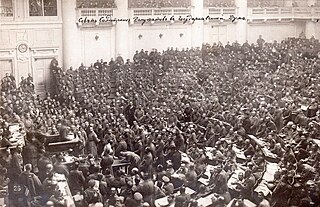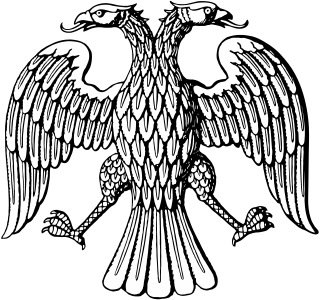
The Bolsheviks, led by Vladimir Lenin, were a far-left faction of the Marxist Russian Social Democratic Labour Party (RSDLP) which split with the Mensheviks at the Second Party Congress in 1903. The Bolshevik party seized power in Russia in the October Revolution of 1917, and was later renamed the Communist Party of the Soviet Union. Their ideology and practices, based on Leninist and later Marxist–Leninist principles, are known as Bolshevism.

The October Revolution, also known as the Great October Socialist Revolution, or October Coup, was a revolution in Russia led by the Bolshevik Party of Vladimir Lenin that was a key moment in the larger Russian Revolution of 1917–1923. It was the second revolutionary change of government in Russia in 1917. It took place through an armed insurrection in Petrograd on 7 November 1917 [O.S. 25 October]. It was the precipitating event of the Russian Civil War.

The Russian Revolution was a period of political and social change in the Russian Empire, starting in 1917. This period saw Russia abolish its monarchy and adopt a socialist form of government following two successive revolutions and a bloody civil war. The Russian Revolution can also be seen as the precursor for the other European revolutions that occurred during or in the aftermath of World War I, such as the German Revolution of 1918–1919.

The Soviet Union, officially the Union of Soviet Socialist Republics (USSR), was a transcontinental country that spanned much of Eurasia from 1922 to 1991. The country was a successor state to the Russian Empire; it was nominally a federal union of fifteen national republics, the largest and most populous of which was the Russian SFSR, but in practice both its government and its economy were highly centralized until its final years. As a one-party state governed by the Communist Party of the Soviet Union, it was a flagship communist state.
A satellite state or dependent state is a country that is formally independent in the world but under heavy political, economic, and military influence or control from another country. The term was coined by analogy to planetary objects orbiting a larger object, such as smaller moons revolving around larger planets, and is used mainly to refer to Central and Eastern European countries of the Warsaw Pact during the Cold War, as well as to Mongolia and Tuva between 1924 and 1990, all of which were economically, culturally, and politically dominated by the Soviet Union. While primarily referring to the Soviet-controlled states in the Central and Eastern Europe or Asia, in some contexts the term also refers to other countries under the Soviet hegemony during the Cold War, such as North Korea, Cuba, and some countries in the American sphere of influence, such as South Vietnam. In Western usage, the term has seldom been applied to states other than those in the Soviet orbit. In Soviet usage, the term applied to the states in the orbit of Nazi Germany, Fascist Italy, and Imperial Japan, whereas in the West the term to refer to those has typically been client states.

Trotskyism is the political ideology and branch of Marxism developed by Russian revolutionary Leon Trotsky and some other members of the Left Opposition and Fourth International. Trotsky described himself as an orthodox Marxist, a revolutionary Marxist, and a Bolshevik–Leninist as well as a follower of Marx, Engels, Vladimir Lenin, Karl Liebknecht, and Rosa Luxemburg.

The Communist International (Comintern), also known as the Third International, was an international organization founded in 1919 that advocated world communism, and which was led and controlled by the Communist Party of the Soviet Union. The Comintern resolved at its Second Congress in 1920 to "struggle by all available means, including armed force, for the overthrow of the international bourgeoisie and the creation of an international soviet republic as a transition stage to the complete abolition of the state". The Comintern was preceded by the dissolution of the Second International in 1916.
A Soviet republic, a republic ruled by soviets, may refer to one of the following:

The Singing Revolution was a series of events from 1987 to 1991 that led to the restoration of independence of the three Soviet-occupied Baltic countries of Estonia, Latvia, and Lithuania at the end of the Cold War. The term was coined by an Estonian activist and artist, Heinz Valk, in an article published a week after the 10–11 June 1988 spontaneous mass evening singing demonstrations at the Tallinn Song Festival Grounds.
The Russian Revolution was a series of uprisings that led to the fall of the Russian Empire, the end of Russian involvement in the First World War (1914-1918), the Russian Civil War (1917-1923), and the establishment of the Union of Soviet Socialist Republics (USSR).

A soviet was a workers' council in the late Russian Empire, primarily associated with the Russian Revolution, which gave the name to the latter state of the Soviet Union.
War in Afghanistan, Afghan war, or Afghan civil war may refer to:

Anti-Sovietism or anti-Soviet sentiment refers to persons and activities that were actually or allegedly aimed against the Soviet Union or government power within the Soviet Union.

Nariman Karbalayi Najaf oghlu Narimanov was an Azerbaijani Bolshevik revolutionary, writer, publicist, politician and statesman. For just over one year beginning in May 1920, Narimanov headed the government of Soviet Azerbaijan. He was subsequently elected chairman of the Union Council of the Transcaucasian SFSR. He was also Party Chairman of the Central Executive Committee of the Soviet Union from 30 December 1922 until the day of his death.
Eurasianism is a socio-political movement in Russia that emerged in the early 20th century which states that Russia does not belong in the "European" or "Asian" categories but instead to the geopolitical concept of Eurasia governed by the "Russian world", forming an ostensibly standalone Russian civilization. Historically, the Russian Empire was Euro-centric and generally considered a European/Western power.

The Russian Soviet Federative Socialist Republic, previously known as the Russian Soviet Republic and the Russian Socialist Federative Soviet Republic, as well as being unofficially referred to as Soviet Russia, the Russian Federation, or simply Russia, was an independent federal socialist state from 1917 to 1922, and afterwards the largest and most populous constituent republic of the Soviet Union (USSR) from 1922 to 1991, until becoming a sovereign part of the Soviet Union with priority of Russian laws over Union-level legislation in 1990 and 1991, the last two years of the existence of the USSR. The Russian SFSR was composed of sixteen smaller constituent units of autonomous republics, five autonomous oblasts, ten autonomous okrugs, six krais and forty oblasts. Russians formed the largest ethnic group. The capital of the Russian SFSR and the USSR as a whole was Moscow and the other major urban centers included Leningrad, Stalingrad, Novosibirsk, Sverdlovsk, Gorky and Kuybyshev. It was the first socialist state in the world.
The third camp, also known as third camp socialism or third camp Trotskyism, is a branch of socialism that aims to oppose both capitalism and Stalinism by supporting the organised working class as a "third camp".

The All Russian Constituent Assembly was a constituent assembly convened in Russia after the February Revolution of 1917. It met for 13 hours, from 4 p.m. to 5 a.m., 18–19 January [O.S. 5–6 January] 1918, whereupon it was illegally dissolved by the Bolshevik-led All-Russian Central Executive Committee, proclaiming the Third All-Russian Congress of Soviets the new governing body of Russia.
Socialism in one country was a Soviet state policy to strengthen socialism within the country rather than socialism globally. Given the defeats of the 1917–1923 European communist revolutions, Joseph Stalin encouraged the theory of the possibility of constructing socialism in the Soviet Union. The theory was eventually adopted as Soviet state policy.
Proletarian internationalism, sometimes referred to as international socialism, is the perception of all proletarian revolutions as being part of a single global class struggle rather than separate localized events. It is based on the theory that capitalism is a world-system and therefore the working classes of all nations must act in concert if they are to replace it with communism.











